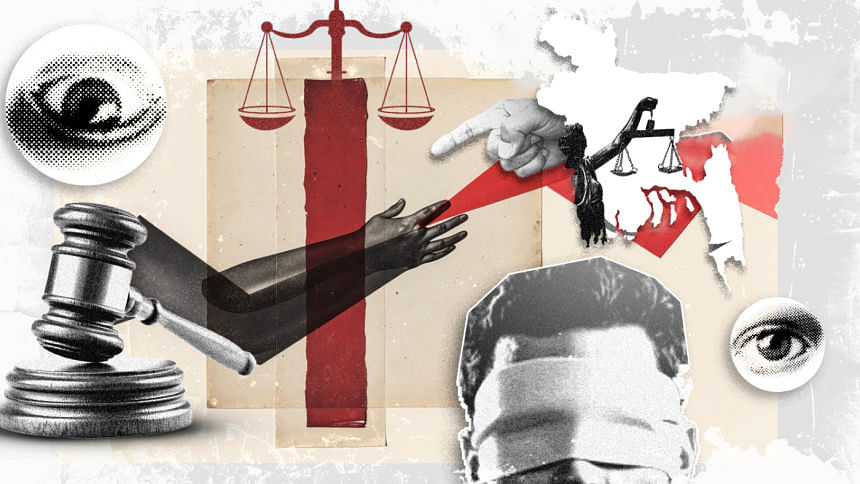New amendment to the Anti-Terrorism Act can be used to assault free speech

In an extraordinary turning point in Bangladesh's political history, the interim government has ordered a "temporary suspension" of the Awami League (AL), the country's oldest political party. The interim government amended the Anti-Terrorism Act, 2009 to authorise the temporary suspension of all activities of any entity, and this amendment provided the legal basis for AL's suspension. The move followed a resurgence of student-led protests after an attack on Hasnat Abdullah (a leader of the July uprising), which was blamed on AL supporters. Demands for tougher action against the AL intensified as political parties, student organisations, and pressure groups joined demonstrations calling for a ban on the party. The government claims the amendment was necessary to ensure accountability for the atrocities committed during those protests and to ensure national security. Yet, the implications of this sweeping expansion of state power are chilling for free speech and the right to protest for at least two deeply troubling reasons.
First, the state now has the power to "temporarily suspend" any entity that it believes is involved in terrorist activities in addition to its earlier power to "prohibit" an organisation under Section 18. The sweeping powers it had against a prohibited organisation (under Section 20) is now automatically extended to temporary suspended entities as well. These powers include shutting down their offices, blocking and freezing bank accounts and other assets, prohibiting members from leaving the country, confiscating their belongings, and prohibiting any public displays of support for the entities.
Therefore, the state can now paralyse a party or organisation immediately through the softer sounding process of "temporary suspension," without needing to "prohibit" it.
However, how temporary is a temporary suspension? We do not know because the amendment does not set any defined time limits, which means it can remain indefinite in practice, even if it is rhetorically called "temporary."
Second, and perhaps most chillingly, the amendment drastically expands the state's powers to prohibit actions in support of the prohibited/suspended entity under Section 20(e), which now stipulates, "The publication or printing of any press statement, or any kind of promotion through mass media, online, social media platforms, or any other means, or organising or participating in any procession, meeting, gathering, or press conference in favour of, on behalf of, or in support of the said entity shall be prohibited." This prohibition must be read with Section 9 of the act, which criminalises those who support a prohibited entity with up to seven years of imprisonment and fine. Essentially, if anything anyone says or does can be interpreted as being in support of even a temporarily suspended entity, then it appears they may be punished with up to seven years of imprisonment.
Now, of course, anyone supporting an organisation credibly suspected of promoting terrorism should be stopped. However, the worry is that the wording in both the original Anti-Terrorism Act and the amendments just made to it are so broad and vague that there is nothing in the law to prevent repressive provisions such as 20(e) from potentially covering the conduct of not only all members of a temporarily suspended entity itself, but also journalists, activists, and ordinary citizens whose dissent (even on social media) might be interpreted as being "in support" of the entity.
The Anti-Terrorism Act, 2009 was one of the first draconian laws introduced by the AL government to test the boundaries of state power after taking office. It granted sweeping punitive powers under the banner of counterterrorism and set the template for later repressive laws justified in the name of fighting propaganda (Digital Security Act, 2018), drugs (Narcotics Act, 2018), and other perceived threats.
While we may have every faith that a government we trust will only use such powers against those who pose a real terrorist threat, the point is that the law is broad enough for the reverse to be true as well. And draconian laws have a tendency to outlast both trustworthy and untrustworthy governments. So, I trust clear legal limits more than I trust any government with unchecked powers. The real question is not what one hopes a repressive law will be used for, but what it has the inbuilt potential to be used for.
Aside from the threats to free speech and right to protest outlined above, the decision to temporarily suspend the AL under the Anti-Terrorism Act sets an extremely dangerous precedent for other reasons as well. When a party, like the AL, has perpetrated widespread human rights violations, the correct course of action is electoral rejection and individual legal accountability for their unlawful acts, not pre-emptive and blanket suspension under the pretext of national security, a justification that can and has too often served as a blunt instrument for erasing political opposition.
Anyone supporting an organisation credibly suspected of promoting terrorism should be stopped. However, the worry is that the wording in both the original Anti-Terrorism Act and the amendments just made to it are so broad and vague that there is nothing in the law to prevent repressive provisions such as 20(e) from potentially covering the conduct of not only all members of a temporarily suspended entity itself, but also journalists, activists, and ordinary citizens whose dissent (even on social media) might be interpreted as being 'in support' of the entity.
The claim that AL should be banned because, as a governing party, it ordered killings and human rights violations, and many within the party carried them out, nevertheless constitutes collective punishment despite having intuitive appeal. Collective sanctions directly violate the foundational principle of individual criminal responsibility under both international human rights law and international criminal law, which protect against guilt by association and demand that punishment be based solely on proven individual culpability before an independent tribunal. Historically, collective punishment has not been an effective tool to end cycles of violence; rather, it has institutionalised revenge politics as governance strategy, normalising authoritarian restrictions on fundamental freedoms and stripping transitional justice of legitimacy.
Any comparison to transitional justice mechanisms in post-apartheid South Africa, post-conflict Liberia, and Bosnia is misapplied. These contexts involved extraordinary circumstances: genocide, ethnic cleansing, or civil war. Bangladesh's current situation, though severe, does not equate to those legally defined thresholds of mass atrocity requiring radical party dissolution. Even in those cases, restrictions on political participation were applied narrowly and temporarily, with clear international oversight and often as part of negotiated settlements. No comparable consensus, legal determination, or process has occurred in Bangladesh to trigger that exceptional threshold. Moreover, post-conflict frameworks such as the South African TRC were specific to their contexts and never intended as universal templates for banning parties in transitional democracies struggling with authoritarian relapse.
Student movements have indeed played a vital role in Bangladesh's democratic history, but respecting their courage does not mean endorsing blanket party bans that risk undermining the very legacy of the revolution for which so many students gave their blood, and that could dangerously destabilise the democratic order they fought to build. The irony is inescapable: the very fundamental human rights to freedom of expression and assembly which student activists were brutally punished for exercising in the July uprising—and which the AL government violently sought to suppress—are now again at risk through this indiscriminate measure. Under the International Covenant on Civil and Political Rights (ICCPR), to which Bangladesh is a party, such a restriction requires rigorous deliberation for legality, necessity, and proportionality, in order to ensure that blanket prohibitions are an absolute last resort.
Instead of imposing a blanket ban, the Bangladesh government could have ensured the security of July movement activists, plaintiffs, and witnesses through targeted and rights-respecting measures consistent with the ICCPR. These include prosecuting individual AL leaders who are legitimately accused of violations, imposing targeted restrictions on violent factions rather than the entire party, regulating specific activities posing risks, deploying impartial security forces, and promoting political dialogue to prevent violence. Each of these alternatives would address legitimate security concerns while minimising infringements on the freedoms of association, expression, and political participation. A blanket ban is the most extreme form of restriction and, under international law, permissible only when such less restrictive means have been demonstrably insufficient.
Finally, the argument that legal accountability must precede political participation falsely assumes that banning an entire party is the best route to ensuring legal accountability of its members facing trial. In fact, global experience suggests the opposite: exclusion fuels grievances, delegitimises transitions, and often leads to further cycles of instability. Transitional justice scholarship warns precisely against the temptation to use structural guilt to dissolve political opposition wholesale. The burden must always remain on proving individual responsibility, not collective organisational guilt.
Banning a major political party with an entrenched history and well-established voter base risks transforming an already wounded democracy into a vengeful exclusionary system, creating martyrs out of perpetrators and further polarising an already fractured society. True democratic renewal requires dismantling the apparatus of repression while maintaining the principle of political pluralism, without which no democratic rebirth can sustainably take root.
The use of the Anti-Terrorism Act to justify the ban on the AL exposes the perverse circularity of revenge politics in Bangladesh. The same repressive legislation that the AL once crafted to crush its political opponents under the banner of fighting terrorism is now being used against it with renewed zeal.
Yet, as philosopher and civil rights activist Audre Lorde warned, "The master's tools will never dismantle the master's house. They may allow us to temporarily beat him at his own game, but they will never enable us to bring about genuine change."
Taqbir Huda is a human rights lawyer, currently pursuing graduate studies at Harvard Law School. He can be reached at [email protected].
Views expressed in this article are the author's own.
Follow The Daily Star Opinion on Facebook for the latest opinions, commentaries and analyses by experts and professionals. To contribute your article or letter to The Daily Star Opinion, see our guidelines for submission.

 For all latest news, follow The Daily Star's Google News channel.
For all latest news, follow The Daily Star's Google News channel. 





Comments